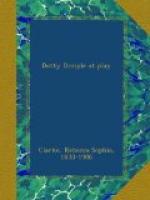“Sure now,” said Norah, “I should think you’d be wanting to go and see what’s become of your sister Prudy. Maybe she’s off on the street somewhere, and never asked you to go with her.”
“Now you’re telling a hint,” exclaimed Dotty, making a dash at a turnip. “I know what you mean by your monkeys and things; you want to get me away. It’s not polite to tell hints, Norah; my mamma says so.”
But as Dotty began to see that she really was not wanted, she concluded to go, though she must have it seem that she went of her own accord, and not because of Norah’s “hints.”
“Did you think it was a buggler, when I opened the cellar-door last night, Norah?”
“No; I can’t say as I did—not when I looked at you,” replied Norah, gravely.
“’Cause I’m going into the parlor to ask mother if she thought I was a buggler. I believe I won’t help you any more now, Norah; p’rhaps I’ll come out by and by.”
So Dotty skipped away; but it never occurred to her that she had been troublesome. She merely thought it very strange Norah did not appreciate her services.
“I s’pose she knows mother’ll help her if I don’t,” said she to herself.
Dotty’s goodness ran on with a ceaseless flow till two o’clock, when that event took place which the children regarded as the most important one of the day—that is, dinner.
After the silent blessing, Mr. Parlin turned to his youngest daughter, and said,—
“Alice, do you know what Thanksgiving Day is for?”
“Yes, sir; for turkey.”
“Is that all?”
“No, sir; for plum pudding.”
“What do you think about it, Prudy?”
“I think the same as Dotty does, sir,” replied Prudy, with a wistful glance at her father’s right hand, which held the carving knife.
“What do you say, Susy?”
“It comes in the almanac, just like Christmas, sir; and it’s something about the Pilgrim Fathers and the Mayflower.”
“No, Susy; it does not come in the almanac; the Governor appoints it. We have so many blessings that he sets apart one day in the year in which we are to think them over, and be thankful for them.”
“Yes, sir; yes, indeed,” said Susy. “I always knew that.”
“Now, before I carve the turkey, what if I ask the question all around what we feel most thankful for to-day? We will begin with grandmamma.”
“If thee asks me first,” said grandma Read, clasping her blue-veined, beautiful old hands, “I shall say I have everything to be thankful for; but I am most thankful for peace. Thee knows how I feel about war.”
The children thought this a strange answer. They had almost forgotten there had ever been a war.
“Now, Mary, what have you to say?” asked Mr. Parlin of his wife.
“I am thankful we are all alive,” replied Mrs. Parlin, looking at the faces around the table with a loving smile.




